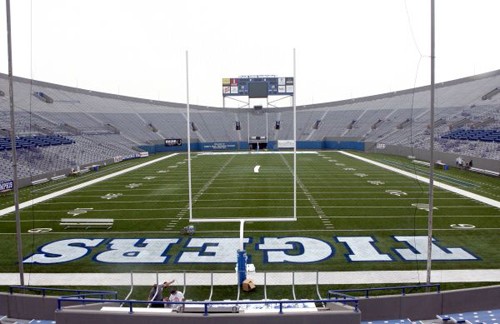For a city that is losing population, jobs, and taxpayers, Memphis is sure doing a lot of new government-funded building.
New high schools, a massive parking garage at the airport, a parking garage at Overton Square, a boat landing, and now $12 million more in renovations and handicapped seating at Liberty Bowl Memorial Stadium, which needs more seats of any kind like it needs a tornado or a power failure. There are two games left on the schedule in 2012 — the University of Memphis season-ender against Southern Mississippi Saturday and the AutoZone Liberty Bowl in December. Take those two games, add the “crowds” at three or four more games, and you might, just might, fill the 61,000-seat stadium. Fudging attendance numbers is standard practice, but I was a bit shocked last year to see the full extent of the charade after the Division of Parks coughed up the numbers, which were barely half the “announced” figures.
The justification for spending another $12 million is the federal government’s Justice Department and the enforcement of the Americans with Disabilities Act (ADA). Having researched the subject five years ago when it came up in the last years of the Herenton administration, I was under the impression that additional seats had been added or were then in the process of being added, and the problem was no more. Several users of the handicapped seats told me as much. Either my sample was flawed or things have changed, because 288 seats and companion seats are on order.
In e-mails, Mayor A C Wharton and Housing and Community Development director Robert Lipscomb told me they cut the best deal they could with Justice, which initially recommended $40 million in improvements. Wharton did not dispute the fact that the stadium usually has thousands of empty seats, including many in the special sections, but figured he had to deal or risk litigation that would stall (as if it has not been stalled already) redevelopment of the Fairgrounds. Lipscomb cautioned that the enforcers at Justice are not to be taken lightly lest they decide to look askance at other proposals from Memphis.
“I am comfortable with the number we have reached,” said Wharton. “By settling we control the number. Litigation would have been a costly crap shoot.”
Added Lipscomb, “This brings to closure an argument that has gone on since 2005, dramatically improves our relationship and perception of the city from the perspective of the DOJ and other federal agencies with grant dollars, saves legal fees that have been accumulating over seven years, and allows the city to move forward with the Fairgrounds Plan.”
What is missing in this account are the voices of the football fans using and not using the handicapped seats at the stadium. Are the improvements so far insufficient? In what way? Are there too few seats? Have people been turned away because of a seating shortage or an access problem? If so can it be remedied with something other than 280 new seats? It defies common sense that there is a seat shortage of any kind in a stadium that, on most of its nine event dates a year, has tens of thousands of empty seats. The biggest crowd last year, remember, was the Mississippi State game, which drew only 33,990. The season-ender barely drew 3,000. There isn’t enough fabric to mask the empty seats and sections at a game like that.
The local government refrain is that the federal government is unyielding on this subject, so move on. Strange to hear that coming from career government employees. Why not invite Justice to send a team of lawyers to the Southern Miss game or the Liberty Bowl and see for themselves? A little PR never hurt. Put a name and a face and a comment for attribution on the person or people at DOJ who insist the funds must be spent, and make them explain why. The federal government, last time I read a newspaper, was in something of a budget crisis itself and throwing its weight around on empty football stadiums in Memphis and bullying public servants hardly seems a priority.
UTILIZATION. Remember that word. It’s the key to the closing-schools story, the baffling airport expansion in the midst of Delta’s contraction, and the threats to close libraries and golf courses. A public facility that is not being used to anywhere near its capacity but remains open in light of maintenance and staffing and ADA obligations is an expensive proposition for this city and its shrinking number of individual and corporate taxpayers. If you don’t say “no more” here, where DO you say it? If you don’t take this crap shoot, when do you take it? And if you pour another $12 million into a stadium that is barely used nine times a year, how do you tell the school board to close 21 schools that are used 180 days a year?
Whoa there, schools and stadiums are different budgets, some will say, apples and oranges. Actually, from a taxpayer’s point of view it is all the same and the distinctions are lost.
Related story: Taking Liberty
